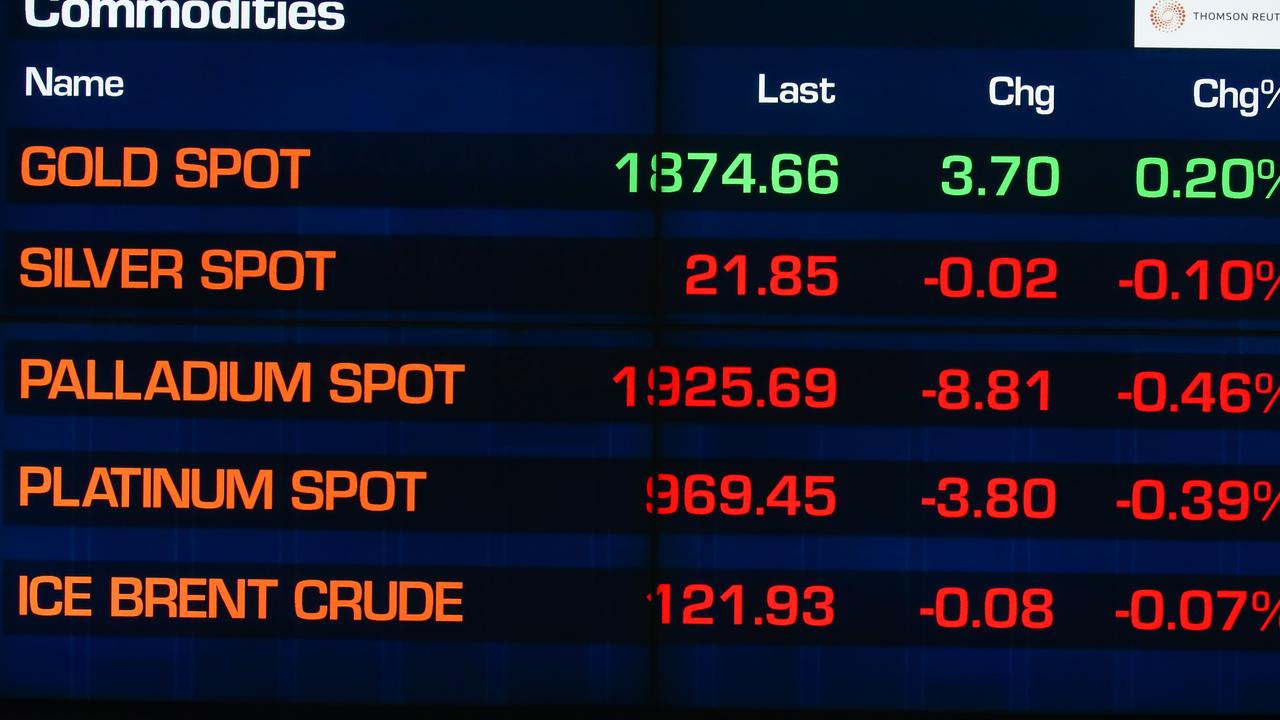Week of pain predicted for Australia as stock market heads into rocky territory
After an extremely difficult week that saw the Aussie stock market plunge in response to recession fears, there looks to be no quick bounce back.

After an extremely difficult week that saw the Aussie stock market plunge in response to recession fears, there looks to be no quick bounce back this week.
The market is struggling hard today with the S&P/ASX 200 index of the top 200 companies tumbling 1.1 per cent to a fresh 19-month low of 6407 in afternoon trading.
Mining companies are seeing big losses after the iron ore futures in China dived 9.1 per cent as concerns mounted about an economic slowdown and the impact it will have on steel demand. Woodside Energy is down 4.7 and BHP is down 4.9 per cent.
The big four banks are seeing small gains, with CBA rising by 1.04 per cent.
Pointsbet is one of the biggest winners, jumping more than 10 per cent after the SIG Sports buy-in and artificial intelligence data services business Appen has surged by 11.01 per cent.
There are concerns there will be more pain on the way this week and that sharp losses in the crypto market will have a flow on effect to wider markets in the following days.

Shane Oliver, AMP Capital chief economist, said Aussie stocks took a 6.6 per cent hit in the past week — representing a massive 15.3 per cent drop from the all-time highs seen earlier this year.
“The fall in the Australian share market was led by IT stocks, which have been under pressure all year, but also resources, retailers and financials as worries increased about the economic outlook,” he said. “The rising risk of global recession also led to falls in oil, metal and iron ore prices.”

“As has been the case all year, the key drivers of the fall in shares remain: high and still rising inflation flowing from pandemic distortions to supply and demand made worse by the war in Ukraine and Chinese lockdowns; central banks stepping up the pace of interest rate hikes; and the rising risk that this will trigger a recession,” Dr Oliver said.
“As always the most speculative ‘assets’ are getting hit the hardest including the pandemic winners of tech stocks (with Nasdaq having fallen 34 per cent) and cryptocurrencies (with Bitcoin down 70 per cent from its high last year).”
Fears crypto pain could spread
As speculative assets like crypto are hammered, it is feared there will be a flow-on effect to the wider market.
According to IMF research note Cryptic Connections, “the analysis suggests that crypto and equity markets have become increasingly interconnected across economies over time”.
The Global Financial Stability note, published in January, predicted significant spillovers from bitcoin to global equity markets.
Despite the fears of a flow-on effect that would spell even further pain for the ailing Australian stock market this week, crypto is currently bouncing back from its slump.
Overnight, bitcoin snapped a 12-day slide, and rose above $20,000 by 7am in a swift turnaround after a record-breaking string of declines.
The world’s largest cryptocurrency climbed 16.5 per cent overnight, recouping much of its losses from a steep drop Saturday that sent the token to as low as $17,599.

Ether, which touched as low as $881 in the sell-off, climbed 28 per cent to $1,139, while alternative coins from Avalanche to Solana also enjoyed gains.
Analysts caution that Sunday’s respite may be brief, and that the overall tone remains negative.
“Cryptocurrencies surged with semi-religious fervour around the marvels of blockchain, decentralised finance, freedom from government, promises that it’s an inflation hedge, only to become a bandwagon fuelled by speculative extrapolation on the back of easy money and low interest rates,” said Dr Oliver.
“The easy money and low rates are reversing, pulling the rug out from under the mania.”




